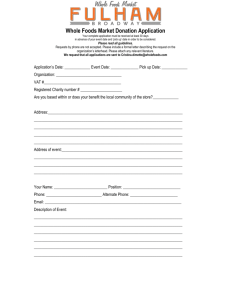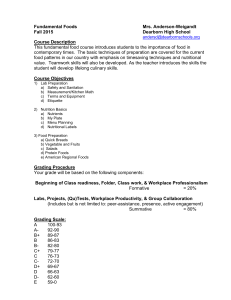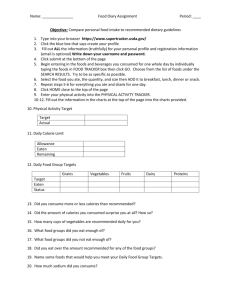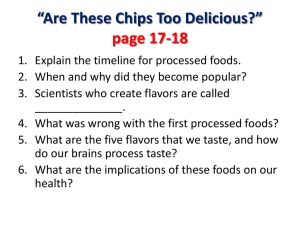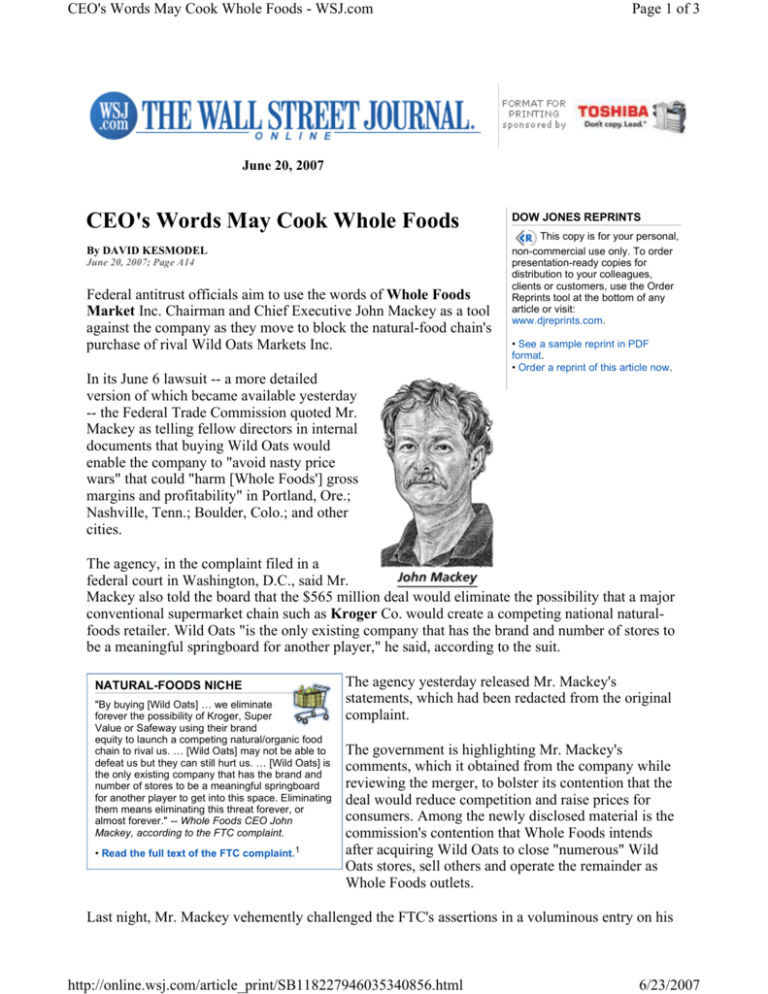
CEO's Words May Cook Whole Foods - WSJ.com
Page 1 of 3
June 20, 2007
CEO's Words May Cook Whole Foods
By DAVID KESMODEL
June 20, 2007; Page A14
Federal antitrust officials aim to use the words of Whole Foods
Market Inc. Chairman and Chief Executive John Mackey as a tool
against the company as they move to block the natural-food chain's
purchase of rival Wild Oats Markets Inc.
In its June 6 lawsuit -- a more detailed
version of which became available yesterday
-- the Federal Trade Commission quoted Mr.
Mackey as telling fellow directors in internal
documents that buying Wild Oats would
enable the company to "avoid nasty price
wars" that could "harm [Whole Foods'] gross
margins and profitability" in Portland, Ore.;
Nashville, Tenn.; Boulder, Colo.; and other
cities.
DOW JONES REPRINTS
This copy is for your personal,
non-commercial use only. To order
presentation-ready copies for
distribution to your colleagues,
clients or customers, use the Order
Reprints tool at the bottom of any
article or visit:
www.djreprints.com.
• See a sample reprint in PDF
format.
• Order a reprint of this article now.
The agency, in the complaint filed in a
federal court in Washington, D.C., said Mr.
Mackey also told the board that the $565 million deal would eliminate the possibility that a major
conventional supermarket chain such as Kroger Co. would create a competing national naturalfoods retailer. Wild Oats "is the only existing company that has the brand and number of stores to
be a meaningful springboard for another player," he said, according to the suit.
NATURAL-FOODS NICHE
"By buying [Wild Oats] … we eliminate
forever the possibility of Kroger, Super
Value or Safeway using their brand
equity to launch a competing natural/organic food
chain to rival us. … [Wild Oats] may not be able to
defeat us but they can still hurt us. … [Wild Oats] is
the only existing company that has the brand and
number of stores to be a meaningful springboard
for another player to get into this space. Eliminating
them means eliminating this threat forever, or
almost forever." -- Whole Foods CEO John
Mackey, according to the FTC complaint.
• Read the full text of the FTC complaint.1
The agency yesterday released Mr. Mackey's
statements, which had been redacted from the original
complaint.
The government is highlighting Mr. Mackey's
comments, which it obtained from the company while
reviewing the merger, to bolster its contention that the
deal would reduce competition and raise prices for
consumers. Among the newly disclosed material is the
commission's contention that Whole Foods intends
after acquiring Wild Oats to close "numerous" Wild
Oats stores, sell others and operate the remainder as
Whole Foods outlets.
Last night, Mr. Mackey vehemently challenged the FTC's assertions in a voluminous entry on his
http://online.wsj.com/article_print/SB118227946035340856.html
6/23/2007
CEO's Words May Cook Whole Foods - WSJ.com
Page 2 of 3
blog on the company's Web site2. He accused the government of "bullying tactics" and said it was
taking internal conversations -- many of them by email -- out of context in order to bolster its
argument.
"They aren't going to place" internal correspondence "in their proper context," he wrote, adding
that many statements by executives were merely part of brainstorming sessions or "macho
posturing" common to any competitive organization.
Mr. Mackey blasted the agency for failing to "bother to actually gather any pricing information
from Whole Foods or Wild Oats" as part of its critique of the merger. Mr. Mackey also wrote: "If
eliminating a competitor is inherently 'bad' or 'wrong' then the FTC should probably never allow
any mergers to ever occur."
In an interview, Jim Sud, executive vice president of growth and development for Whole Foods,
said the company is at "a severe disadvantage" in trying to fight the FTC's stance. "They have the
power to subpoena whatever documents they want," he said. "It's been very one-sided."
Whole Foods, which has submitted more than 20 million
internal documents to the agency, hasn't made any decisions
about how many Wild Oats stores it might close if the deal
goes through, Mr. Sud added. The company lacks financial
information about the Wild Oats stores on which to base
such decisions.
A Wild Oats spokeswoman declined to comment.
Other companies had worried that the commission's
complaint might signal more-aggressive antitrust
enforcement in Washington. But that concern could ease
with the knowledge that the commission's case appears to
be based largely on the companies' own words.
The core of the argument against the deal is that Whole
Foods and Wild Oats are essentially the two leading competitors in a distinct market for premium
organic foods. According to this argument, conventional food retailers such as Wal-Mart Stores
Inc. and Kroger don't really count, even as they increasingly offer similar products in pursuit of
higher profit margins.
For instance, the lawsuit quotes Mr. Mackey as saying that organic foods are "only one part of its
highly successful business model," citing as others "superior quality, superior service ... and
superior store experience." The lawsuit quotes Mr. Mackey as saying, "Wal-Mart doesn't sell
high-quality perishables" and that is "why Wal-Mart isn't going to hurt Whole Foods."
Karen Burk, a Wal-Mart spokeswoman, said the company has "to be doing something right if 127
million customers shop our stores every week."
Whole Foods, of Austin, Texas, agreed in February to buy Wild Oats, of Boulder, Colo., for
$18.50 a share. Whole Foods argues the FTC is defining the natural-foods sector too narrowly,
stressing that Kroger and other chains have been expanding their selection of such foods and even
redesigning stores to look more like Whole Foods' locations. Whole Foods says in a document on
http://online.wsj.com/article_print/SB118227946035340856.html
6/23/2007
CEO's Words May Cook Whole Foods - WSJ.com
Page 3 of 3
its Web site that it faces "substantial" competition from conventional stores and smaller naturalfoods outlets.
When the government sued, it filed its complaint and supporting materials under court seal
because they contained proprietary business information. The Wall Street Journal, owned by Dow
Jones & Co., sent a letter to Judge Paul L. Friedman asking him to unseal many documents,
saying the issues are of public interest.
June 13, the FTC sought to have the full text of its complaint released, and Monday, Whole Foods
and Wild Oats said they wouldn't object.
In 4 p.m. composite trading yesterday on the Nasdaq Stock Market, shares of Whole Foods were
down 56 cents, or 1.4%, to $38.95. Shares of Wild Oats declined 17 cents, or 1%, to $17.03 on the
Nasdaq.
--Dana Cimilluca contributed to this article.
Write to David Kesmodel at david.kesmodel@wsj.com3
URL for this article:
http://online.wsj.com/article/SB118227946035340856.html
Hyperlinks in this Article:
(1)
http://online.wsj.com/public/resources/documents/WholeFoodsComplaint20070619.pdf
(2) http://wholefoodsmarket.com/blogs/jm/
(3) mailto:david.kesmodel@wsj.com
(4) http://blogs.wsj.com/deals/2007/06/19/whole-foods-latest-organic-product-footin-mouth/
(5) http://online.wsj.com/article/SB118117835496527246.html
(6) http://online.wsj.com/article/SB117209195523715275.html
Copyright 2007 Dow Jones & Company, Inc. All Rights Reserved
This copy is for your personal, non-commercial use only. Distribution and use of this material are governed by our
Subscriber Agreement and by copyright law. For non-personal use or to order multiple copies, please contact Dow Jones
Reprints at 1-800-843-0008 or visit www.djreprints.com.
http://online.wsj.com/article_print/SB118227946035340856.html
6/23/2007



